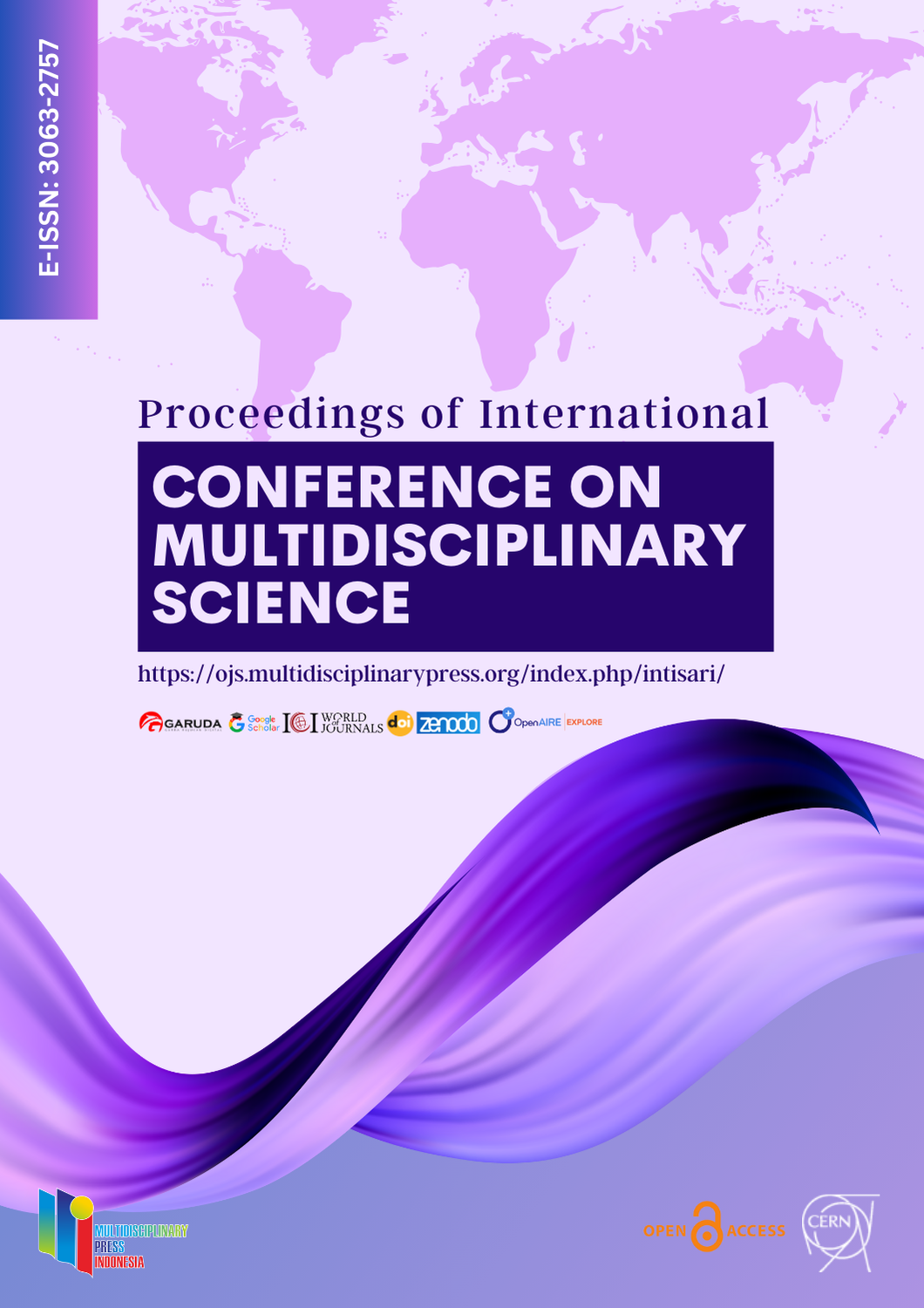Ethical Leadership in Tech Startups: Managing Growth Without Compromising Values
Keywords:
Ethical Leadership, Organizational Culture, Employee Engagement, Business GrowthAbstract
This study examines the impact of ethical leadership practices, organizational culture, and employee engagement on the business growth of Gojek’s driver-partners and merchant partners in Padang. Using a quantitative approach, data were collected from a sample of 63 participants through random sampling. The analysis, conducted using SPSS, included t-tests, F-tests, and R² tests to assess the relationships between the independent variables (ethical leadership, organizational culture, and employee engagement) and the dependent variable (business growth). The results show that ethical leadership practices, organizational culture, and employee engagement have a significant positive influence on business growth, collectively explaining 58.5% of its variance. Ethical leadership emerged as the strongest predictor, followed by organizational culture and employee engagement. The findings suggest that fostering ethical, transparent leadership and a positive organizational culture, alongside encouraging active partner engagement, are crucial for the sustainable growth of Gojek’s driver-partners and merchants. This research provides practical insights for platform-based companies on improving partnership management strategies. However, further investigation is needed to explore additional factors influencing business growth in the gig economy context.
Downloads
References
Bakker, A. B., & Albrecht, S. L. (2018). Work engagement: Current trends. Career Development International, 23(1), 4-11. https://doi.org/10.1108/CDI-11-2017-0207
Bedi, A., Alpaslan, C. M., & Green, S. (2016). A meta-analytic review of ethical leadership outcomes and moderators. Journal of Business Ethics, 139(3), 517-536. https://doi.org/10.1007/s10551-015-2625-1
Blank, S. (2013). The startup owner's manual: The step-by-step guide for building a great company. K&S Ranch.
Brown, M. E., & Treviño, L. K. (2020). Ethical leadership: A review and future directions. Annual Review of Organizational Psychology and Organizational Behavior, 7(1), 1-28. https://doi.org/10.1146/annurev-orgpsych-012119-045303
Brush, C. G. (2008). Pioneering strategies for entrepreneurial success: The role of growth. Academy of Management Perspectives, 22(1), 46-59. https://doi.org/10.5465/amp.2008.29015104
Cameron, K. S., & Quinn, R. E. (2011). Diagnosing and changing organizational culture: Based on the competing values framework (3rd ed.). Jossey-Bass.
Chaudhary, R., Rangnekar, S., & Barua, M. K. (2022). Remote working and employee engagement: A qualitative study of Indian employees during the COVID-19 pandemic. Human Resource Development Review, 21(3), 317-342. https://doi.org/10.1177/15344843221087957
Ciulla, J. B. (2014). Ethics, the heart of leadership (3rd ed.). Praeger.
Eisenbeiss, S. A. (2012). Re-thinking ethical leadership: An interdisciplinary integrative approach. The Leadership Quarterly, 23(5), 791-808. https://doi.org/10.1016/j.leaqua.2012.03.001
Groysberg, B., Lee, J., Price, J., & Cheng, J. Y. J. (2018). The leader’s guide to corporate culture. Harvard Business Review, 96(1), 44-52.
Gursoy, D., Chi, C. G., & Karadag, E. (2021). The impact of the COVID-19 pandemic on hospitality firms’ organizational practices and performance. Journal of Hospitality Marketing & Management, 30(5), 529-549. https://doi.org/10.1080/19368623.2021.1867286
Healy, J., Nicholson, D., & Pekarek, A. (2017). Should we take the gig economy seriously? Labour & Industry: a journal of the social and economic relations of work, 27(3), 232-248. https://doi.org/10.1080/10301763.2017.1377048
Kalshoven, K., Den Hartog, D. N., & De Hoogh, A. H. (2016). Ethical leadership and followers' helping and initiative: The role of demonstrated responsibility and job autonomy. European Journal of Work and Organizational Psychology, 25(6), 942-953. https://doi.org/10.1080/1359432X.2015.1072143
Kahn, W. A. (1990). Psychological conditions of personal engagement and disengagement at work. Academy of Management Journal, 33(4), 692-724. https://doi.org/10.2307/256287
Kuhn, K. M., & Maleki, A. (2017). Micro-entrepreneurs, dependent contractors, and instaserfs: Understanding online labor platform workforces. Academy of Management Perspectives, 31(3), 183-200. https://doi.org/10.5465/amp.2015.0111
Lee, J. Y., Kim, S., & Park, S. (2018). The impact of organizational culture on organizational performance: The mediating role of employee engagement. Human Resource Development International, 21(1), 1-16. https://doi.org/10.1080/13678868.2017.1381765
Maak, T., Pless, N. M., & Voegtlin, C. (2022). The leader as steward of economic and societal progress: A behavioral ethics perspective. Journal of Business Ethics, 177(3), 561-579. https://doi.org/10.1007/s10551-021-04854-6
Martins, E. C., & Terblanche, F. (2020). Building organizational culture that stimulates creativity and innovation. European Journal of Innovation Management, 23(3), 402-425. https://doi.org/10.1108/EJIM-12-2018-0257
Newman, A., Round, H., Bhatti, W. A., & Tse, H. H. (2020). Ethical leadership and employee creative performance: The mediating role of job autonomy. Journal of Business Ethics, 160(4), 1295-1312. https://doi.org/10.1007/s10551-018-3925-6
Ng, T. W. H., & Feldman, D. C. (2015). Ethical leadership: Meta-analytic evidence of criterion-related and incremental validity. Journal of Applied Psychology, 100(3), 948-965. https://doi.org/10.1037/a0038246
O’Reilly, C. A., & Tushman, M. L. (2016). Lead and disrupt: How to solve the innovator’s dilemma. California Management Review, 58(4), 66-83. https://doi.org/10.1525/cmr.2016.58.4.66
Penrose, E. T. (2009). The theory of the growth of the firm (4th ed.). Oxford University Press.
Rana, S., Ardichvili, A., & Tkachenko, O. (2021). A theoretical model of the antecedents and outcomes of employee engagement: Dubin’s method. Journal of Workplace Learning, 33(2), 127-142. https://doi.org/10.1108/JWL-06-2020-0101
Resick, C. J., Hanges, P. J., Dickson, M. W., & Mitchelson, J. K. (2011). Ethical leadership, moral judgment, and leadership effectiveness: The mediating role of follower moral identity. The Leadership Quarterly, 22(3), 528-544. https://doi.org/10.1016/j.leaqua.2011.03.002
Saks, A. M. (2022). A critique of employee engagement. Human Resource Development Review, 21(3), 223-253. https://doi.org/10.1177/15344843221094929
Schilling, M. A. (2020). Strategic management of technological innovation (6th ed.). McGraw-Hill Education.
Schumacker, R. E., & Lomax, R. G. (2016). A beginner's guide to structural equation modeling (4th ed.). Routledge.
Shuck, B., Reio Jr., T. G., & Rocco, T. S. (2017). Employee engagement: An examination of antecedent and outcome variables. Human Resource Development International, 14(4), 427-445. https://doi.org/10.1080/13678868.2011.601587
Treviño, L. K., & Nelson, K. A. (2021). Managing business ethics: Straight talk about how to do it right (8th ed.). Wiley.
Walumbwa, F. O., Hartnell, C. A., & Misati, E. (2017). Does ethical leadership enhance group learning behavior? Examining the mediating influence of group ethical conduct, justice climate, and peer justice. Journal of Business Research, 72, 14-23. https://doi.org/10.1016/j.jbusres.2016.11.013
Wood, A. J., Graham, M., Lehdonvirta, V., & Hjorth, I. (2019). Good gig, bad gig: Autonomy and algorithmic control in the global gig economy. Work, Employment and Society, 33(1), 56-75. https://doi.org/10.1177/0950017018785616
Downloads
Published
How to Cite
Issue
Section
Categories
License
Copyright (c) 2024 Laode Sarfan, Raden Rudi Alhempi

This work is licensed under a Creative Commons Attribution 4.0 International License.





